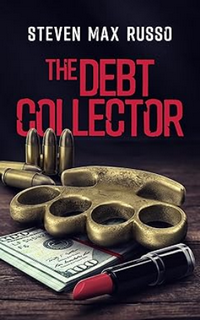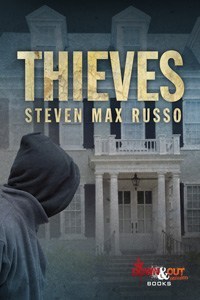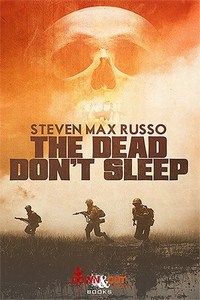This morning I brought you my (overdue) take on Steven Max Russo’s third novel, The Debt Collector, and now I’m very pleased to bring you a few questions about the book with the author.
Last time we talked, you stressed how you were a pantser and many things about the books I asked about just came about as you were writing. But I have to wonder—that striking visual that opens The Debt Collector—did you sit down with that in mind, or did it come up later and put it in during revisions?
That’s a very perceptive question. With my first two novels, Thieves and The Dead Don’t Sleep, the prologues were both written after the novels were pretty much completed. I wanted something vivid and dramatic at the very beginning to draw the reader in. But that wasn’t the case with The Debt Collector.
When I was in college, I was driving through town when I witnessed a young man walk nonchalantly out of liquor store wearing nothing but his underpants – tighty-whities as I recall. It was early afternoon on a warm and sunny spring day. He was carrying what appeared to be a bottle of vodka in one hand and his wallet in the other. It wasn’t a robbery or anything nefarious. No alarms or people screaming or any commotion whatsoever, just a young guy in his underpants walking out of a store in the middle of the day. When I began writing what turned into the The Debt Collector, I just started typing one evening and that memory from my youth of the young guy in his underpants walking out of the store popped into my head and I built the story from there.
Great story…
Along the same lines—with this book, did you have a vague idea for the plot, or did you start with Abigail and/or Hector and create a story for them?
I had no idea of a plot or any characters beyond the opening scene with Abigail and Hector. The story simply emerged as I began writing. When I write, I often feel like I’m just following my characters around in a parallel universe or watching them in something like an old-time newsreel that runs in my head and I simply write what I see and hear. I often feel more like a reporter than a fiction author. I know that sounds strange, but that’s how it feels.
Do you see some sort of line between your protagonists? Are their common traits? Is there some sort of progression between Skooley/Esmeralda, Frank/Bill, and Abigail/Hector?
I’m not really sure how to answer this. I strive to make all of my characters relatable and believable. Their environments and their history and their circumstances are different than those of most people and that obviously affects their world view, but once you learn a little about the individuals, you can at least recognize if not understand their motivations from their unique perspectives. And I guess there are some common traits in my characters, but heck, you can say that about most people. As for any progression of the pairings mentioned in your question, I don’t really see any. Each relationship between the characters is different – Skooley and Esmeralda start as reluctant partners and then evolve into lethal adversaries; Frank and Bill have a warm, familial relationship as uncle and nephew that gets somewhat tested under stress; and Abigail and Hector are basically strangers who develop a friendship and bond under unique circumstances.
Going back to the pantser idea, there are so many little clues, little tidbits tying elements of this novel together—things you may gloss over early on that come back in a satisfying way.
A big part of writing is reading what you wrote – and then re-writing, re-reading, and re-writing over and over (and over) again. Once the main story is established and I have an idea for what I think will make for a satisfying ending, then I go back, re-read (again), and drop in those little clues and tidbits where I think they work best to lead the reader along, help raise the stakes, and/or tie things together.
There are a few characters I’d like to ask you about, but I can’t think of a way to do so without spoiling something (next time—first time?—you’re in Idaho, I’ll buy you a drink and ask), so I’ll let you decide who to talk about? Is there a supporting/minor character that surprised you as you wrote this, that you ended up enjoying more than you expected? Maybe someone that you expected would be around for a scene or two to move the story along and then ended up being a major player?
I think the character in The Debt Collector that surprised me the most was Gino, the mobster who befriends Abby. He’s tough, fearless, smarter than he gives himself credit for, can be empathetic yet follows orders much like a soldier doing what he is ordered to do regardless of his own feelings about what he is doing. Gino is someone who I think could have been successful (and happier) in any number of careers outside of crime, yet probably fell into the life early on and feels trapped in it. He is not college-educated, but I wouldn’t be surprised if he secretly read deeply about issues or topics that he found interesting. He is better than his circumstances and I believe somewhat troubled by his job, but doesn’t feel deep down that he deserves better. I get the feeling that he is neat and tidy, likes literature and art and philosophy and cooking yet can’t really share those interests with others in his circle. He likes and admires Abagail, yet wouldn’t hesitate to take her out if he were ordered to by his boss. I didn’t plan on Gino emerging as a major character until I wrote that scene of he and Albert meeting Abby for the first time in the motel parking lot. I really liked the interaction between the two characters. After that, he just sort or wormed his way into my brain and he kept coming up in the story. He’s the type of character I love; definitely a “bad” guy, but there are also things about him that make him both honorable and endearing in an odd sort of way.
There’s a game we play around here, called “Online Bookstore Algorithm”. What are 3-5 books whose readers may like The Debt Collector?
I’m not very good at picking books for Online Bookstore Algorithm – so I’d rather pick authors. I think if you enjoy the writing styles and books of authors like Elmore Leonard, John Sandford, S.A. Cosby, Lou Berney, and Jordan Harper, then you may like my writing.
I’d co-sign Leonard, Cosby, and Harper. I’ll have to check out the others.
In our last interview, you said you had two other novels underway at that point. Are those finished, or have you moved on to something else? Do you know when we should expect something—and what’s it going to look like?
I am actually working on several new novels (one is a sequel to The Debt Collector) and I’ve written a few short stories. At some point I’d like to put together a collection of my short fiction, but the truth is I don’t have a solid timeline on any of those projects.
Oooh, a sequel? Sign me up!!
well, sign me up for any of those, but really the sequel.
Thanks for your time—and thanks for this read, I enjoyed it and hope you have plenty of success with it!











